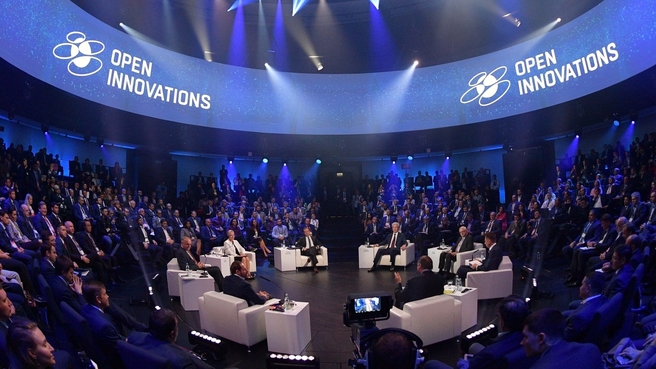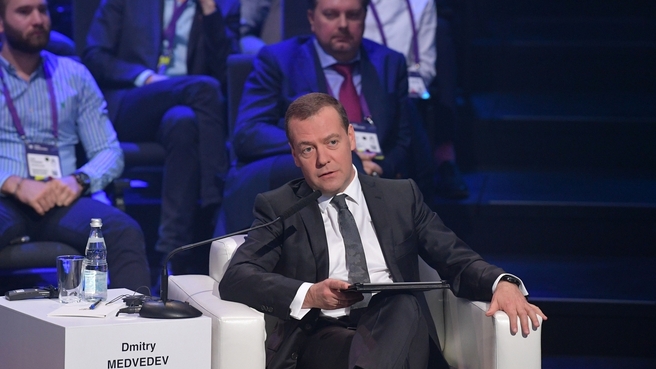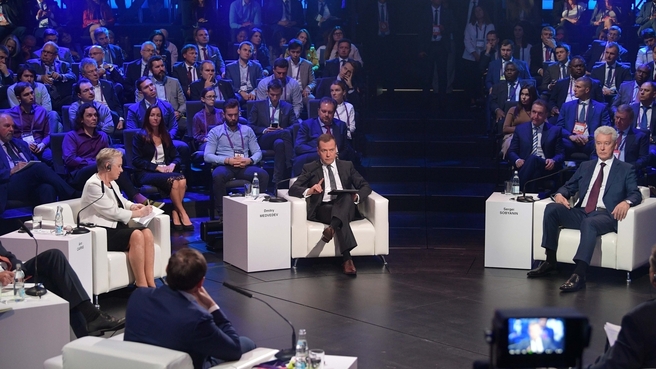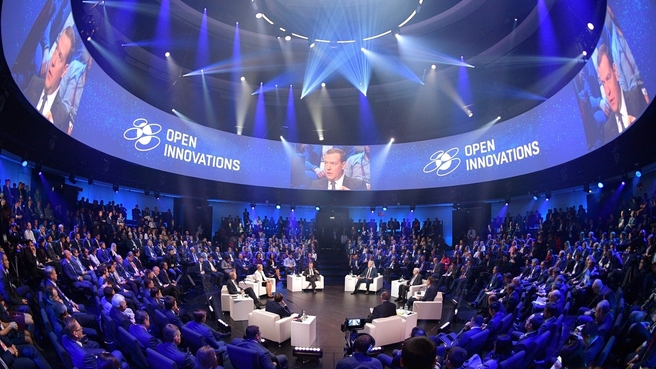The plenary session’s theme is Smart Country: National Strategy.
Plenary session of the 7th Open Innovations Moscow International Forum
The international innovation-driven development forum, Open Innovations, has been held in Moscow since 2012 and is co-hosted by the Ministry of Economic Development, the Moscow Government, the Rusnano Fund for Infrastructure and Educational Programmes, the Russian Venture Company, the Foundation for Promoting Innovation, the Skolkovo Foundation and Vnesheconombank.
In 2018, the Open Innovations forum is taking place between October 15-17 as a three-day themed discussion at the Skolkovo Technology Park with the participation of the Foreign Investment Advisory Council. The theme of this year’s forum is Sources of Digital Breakthrough.
The first day of the forum was dedicated to the digitalisation and modernisation of education. The agenda of the second day includes digital transformation of the business environment and development of the innovation-driven ecosystem. On the third day, the forum participants will focus on science and technology.
Dmitry Medvedev’s remarks at the plenary session:
Plenary session of the 7th Open Innovations Moscow International Forum
Good afternoon, colleagues, ladies and gentlemen,
Once again, welcome to our Open Innovations forum. This is the 7th such forum, and the topic of today’s discussions is Smart Country. Everyone, I’m sure, already knows what a smart home is. Now we need to make a smart home out of our country.
In the digital age, the speed and magnitude of change is growing steadily. To take advantage of the benefits offered by progress, it is imperative to create an environment that is capable of being constantly upgraded. The main components include modern technological infrastructure and readiness of the people to develop and use these innovative technologies. Only in this case is it possible to proceed with digitalisation, which will bring the economy, the social sphere, and state management to a new level of efficiency, to a level that corresponds to the Smart Country concept.
These are the goals Russia is pursuing today. As you may be aware, we have adopted the Digital Economy programme, and it works. Currently it is being reformatted into a national project, which shows the importance we attach to the digital economy. It includes six federal projects on key areas of digitalisation. The cost of the programme is 1 trillion roubles. In all, we will allocate a total of 2 trillion roubles in public investment to developing the digital economy. We clearly understand that the task is complex and there is a lot of work to do. So, I will focus on key areas that should turn Russia into such a smart country.
The first and probably the most important thing is people themselves – for smart people make a Smart Country. On the one hand, we are talking about the leaders of change; on the other hand, what matters is the ability to translate changes into scientific projects, innovative products, various services, and management decisions. I am confident that there are a lot of such people in Russia.
I will give one example, very eloquent in itself: for eight years now, no one has been able to beat our country, our young people at the ACM ICPC International Collegiate Programming Contest. This year, Moscow State University students won the contest, and before them, the ITMO University team held the first place for seven years in a row. No one has ever done that. This is an example proving that we have a really large number of people capable of transforming Russia into a modern Smart Country.
We intend to dramatically increase the number of specialists in the digital economy trained at Russian universities, from 48,000 to 120,000 people per year (by 2024). We will definitely support young mathematicians and computer programmers. This is one of the parts of the Digital Economy programme; funds have been allocated for it.
On the other hand, a Smart Country is hardly possible without the activity of ordinary users. As research shows, people in Russia are much more willing to adopt technological innovations than even the Europeans.
Last year, our country for the first time ranked with the top ten digital economy leaders in the Digital Society Index ranking – due to the high involvement of people. Digital services such as calling a taxi, car sharing, bicycle rental, buying food and other goods online have become an everyday thing for many Russians. In the very least these services have one advantage: they eliminate the middlemen, and therefore make the service less expensive. For a country as large as Russia, this innovation also reaches out to remote areas, qualitatively changing the lives of people there.
E-commerce grew by more than a quarter, by 26 percent last year, and continues to grow. We plan on helping people master new technologies through public educational programmes.
The second point we plan to focus on is infrastructure development. Access to knowledge and competencies must be supported by access to the technology proper. We also have some achievements when it comes to this. Russia ranks first in Europe and sixth in the world by the number of internet users – largely due to the fact that it is less costly than in many developed countries. We simply must keep up this competitive advantage.
However, it must be admitted that digitalisation has mostly covered big cities so far. While Moscow and St Petersburg can be compared with most global leaders, other Russian regions are still lagging behind. We intend to eliminate this digital inequality, especially to be able to expand the potential of medicine, online learning and the provision of public services. This will naturally require the development of data storage and processing infrastructure and network deployment for what is known as the Internet of Things. The Digital Economy programme also stipulates work in these spheres.
One of them is the development of next-generation cellular networks. Russian operators are already testing 5G equipment; the project is costly and requires to be thought out properly. We have to build an infrastructure for new services with increased requirements for data transfer speed and response time. This is probably especially important in the context of the problem the world is now considering – creating artificial intelligence.
Smart Country requires national technological leaders. Digitalisation is a powerful incentive for innovation. Therefore, the third target of our work is cooperation with the most successful high-tech companies and creating incentives for more high-tech companies to grow.
More to be soon…
Follow this news feed: Russia









